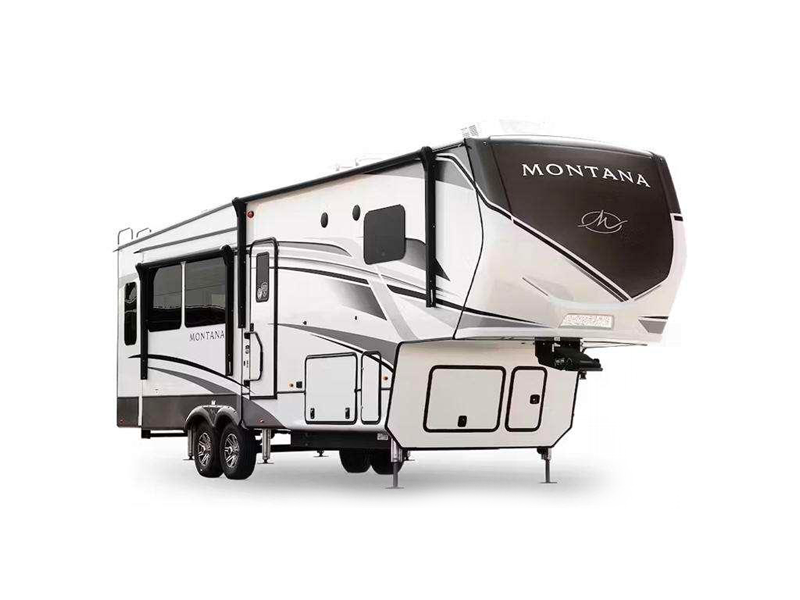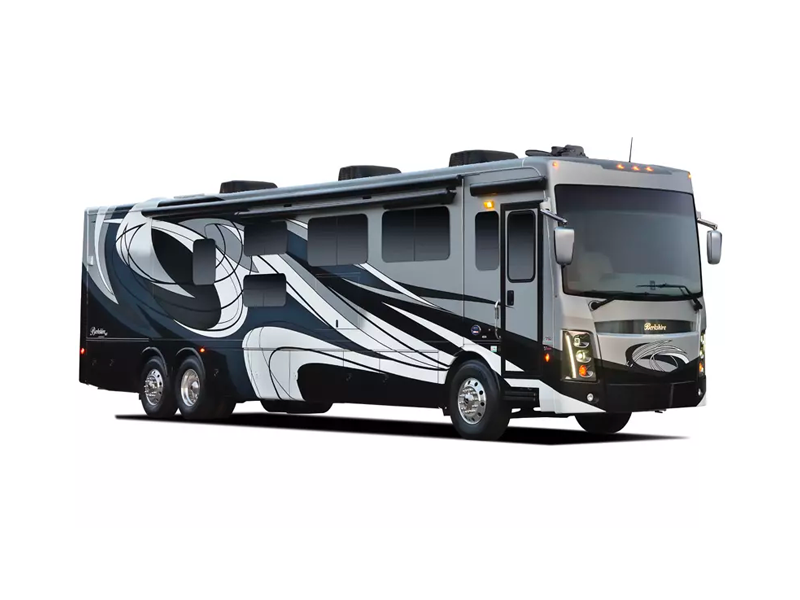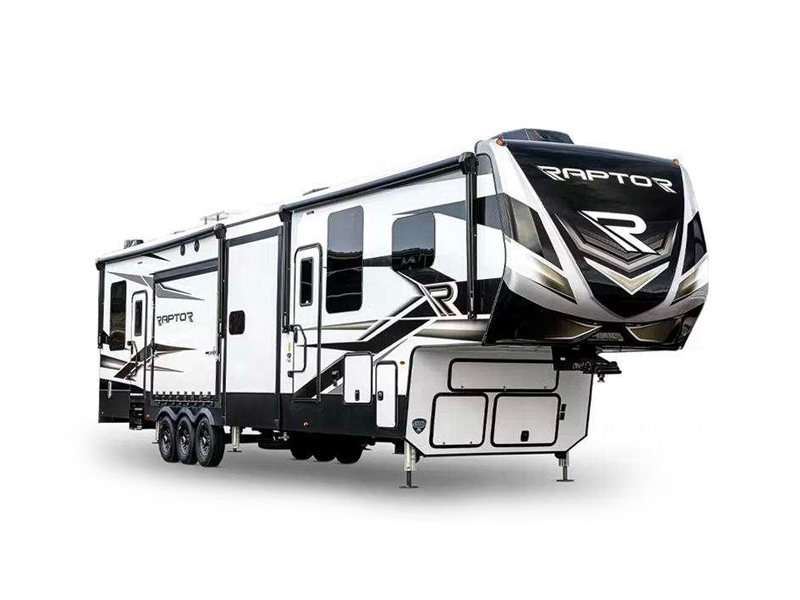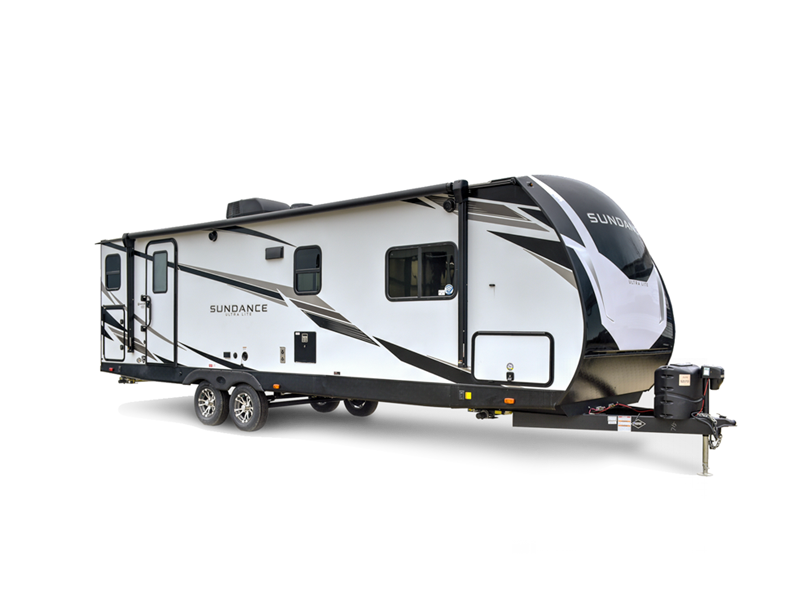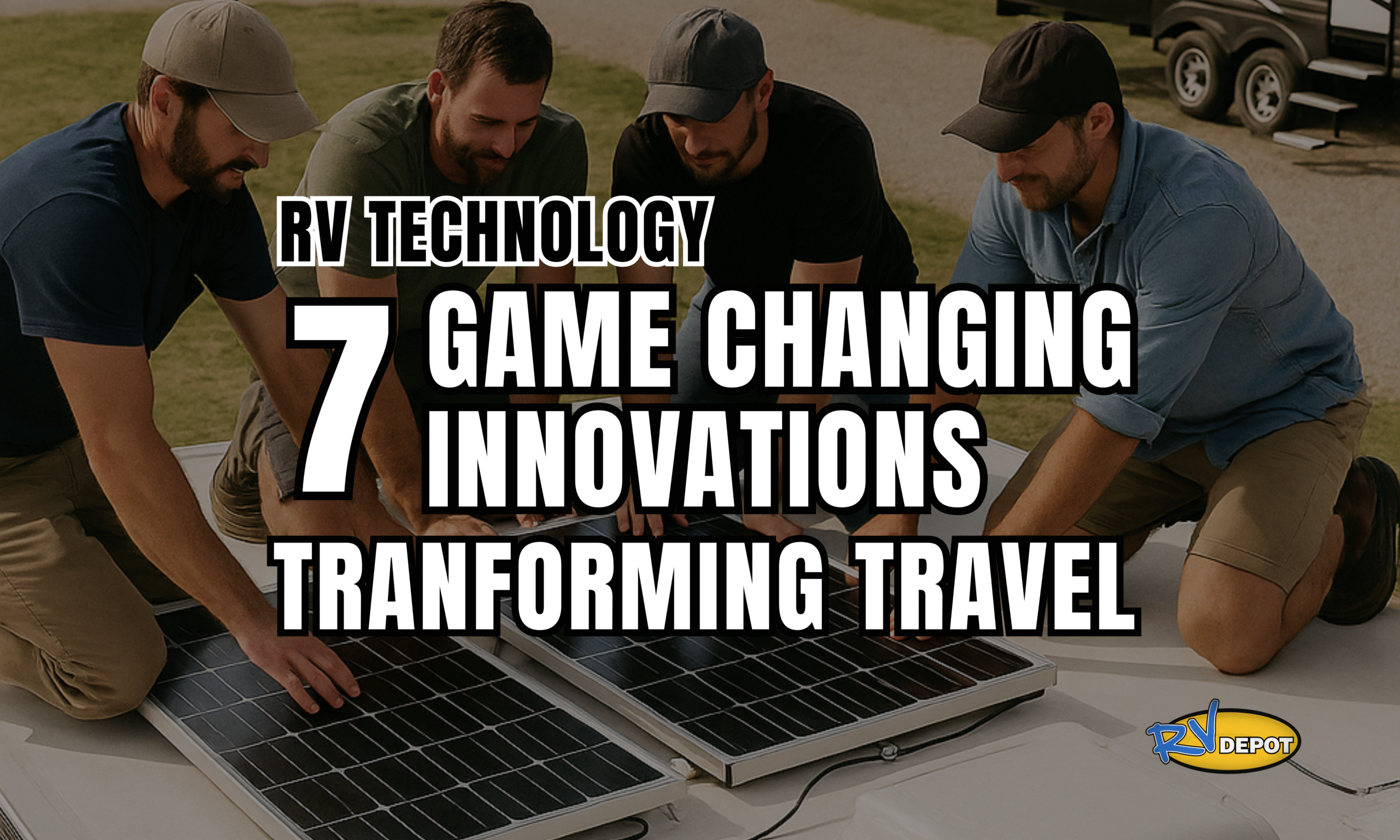The RV industry stands at the threshold of its most dramatic transformation since the introduction of self-contained waste systems in the 1960s. Today’s RV technology revolution is reshaping every aspect of travel, from how we power our adventures to how we navigate, communicate, and even think about mobility itself. This isn’t just about incremental improvements—it’s about fundamental changes that will redefine what’s possible on the open road. Consider this:
The average RV manufactured in 2025 contains more computing power than the Space Shuttle that first launched in 1981. Modern RVs integrate smart home systems, satellite internet, solar power management, and autonomous driving assistance in ways that seemed like science fiction just a decade ago. These aren’t luxury add-ons anymore—they’re becoming standard features that manufacturers include to meet evolving customer expectations.
Key RV Technology Statistics:
- Investment in RV technology R&D increased 340% since 2020
- Electric RV prototypes achieve 200-300 mile ranges
- Smart RV systems monitor over 200 different functions
- Satellite internet now reaches 99% of North American camping locations
At RV Depot in Cleburne, Texas, we’re witnessing this evolution firsthand through the RVs we sell and the customer questions we answer. Today’s RV buyers aren’t just asking about floor plans and storage—they’re inquiring about internet speeds, solar capacity, smart home integration, and future upgrade possibilities. Understanding these RV technology trends helps you make informed decisions about both current purchases and long-term planning.
7 Revolutionary RV Technology Innovations
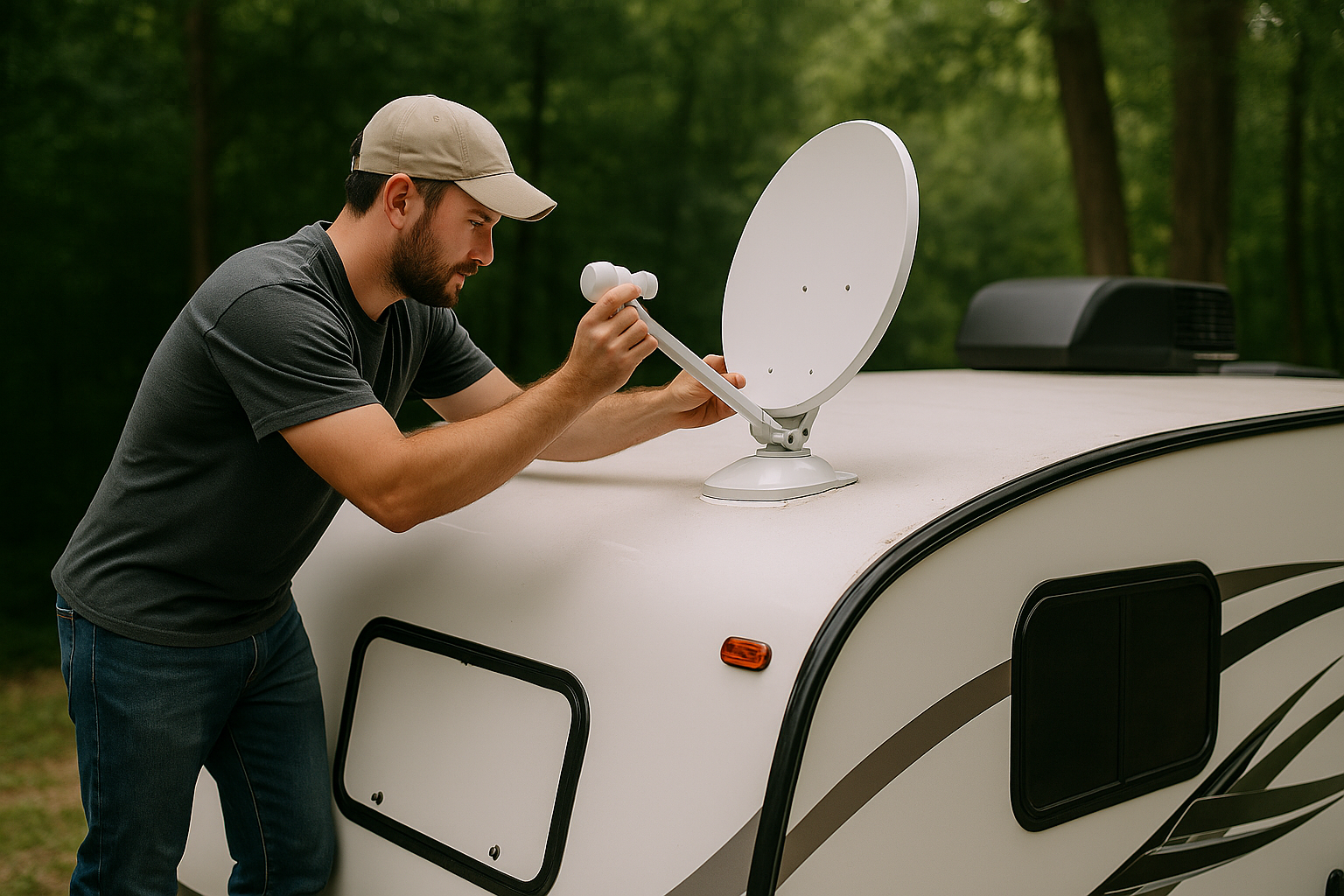
1. Smart Home Integration and IoT Systems
What It Does: Transforms RVs into connected smart homes with automated controls Current Availability: Standard in premium RVs, retrofit options available
| Feature | Capability | Energy Savings |
|---|---|---|
| Smart Climate Control | Automated temperature based on occupancy | Up to 30% |
| Intelligent Lighting | Motion-activated, mood-based adjustments | Up to 25% |
| Security Integration | Remote monitoring, smart locks, cameras | N/A |
| Entertainment Systems | Voice control, streaming optimization | Up to 15% |
Real-World Benefits:
- Pre-cool your RV before arrival using smartphone apps
- Automatically adjust lighting based on time of day and activities
- Monitor security cameras and receive alerts anywhere with internet
- Control all systems through voice commands or smartphone interface
For comprehensive standards on IoT device integration and smart home security, the Consumer Technology Association provides detailed guidelines. These industry standards help ensure that RV technology systems are secure, interoperable, and reliable.
2. Advanced Solar Power and Energy Storage
What It Does: Provides clean, renewable power for extended off-grid camping Current Availability: Widely available with various capacity options
Solar Efficiency Improvements:
| Technology Generation | Power per Sq Ft | Efficiency Rate | Cost per Watt |
|---|---|---|---|
| 2020 Standard | 15-18 watts | 18-20% | $3.50 |
| 2025 Advanced | 22-25 watts | 25-28% | $2.80 |
| 2025 Flexible | 20-22 watts | 22-25% | $3.20 |
Lithium Battery Advantages:
- 3x longer lifespan than traditional batteries
- 50% lighter weight for same capacity
- Faster charging (2-4 hours vs 8-12 hours)
- Maintenance-free operation
3. Satellite Internet and Connectivity Solutions
What It Does: Provides high-speed internet access from virtually anywhere Current Availability: Multiple providers with varying coverage and speeds
Connectivity Comparison:
| Service Type | Speed Range | Coverage | Monthly Cost |
|---|---|---|---|
| Starlink RV | 50-200 Mbps | 99% North America | $150 |
| HughesNet | 25-50 Mbps | 100% Continental US | $100-150 |
| Cellular Boosters | Varies by signal | 95% with towers | $50-100 |
| Public Wi-Fi | 1-25 Mbps | Limited locations | Free |
Impact on RV Travel:
- Enable remote work from anywhere
- Stream entertainment in 4K quality
- Video calls with family and friends
- Access real-time weather and navigation
4. Electric RV Development
What It Does: Eliminates emissions and reduces operating costs Current Availability: Prototypes and limited production models
Electric vs Traditional RV Costs:
| Cost Category | Electric RV | Gas RV | Savings |
|---|---|---|---|
| Fuel/Energy | $0.12/mile | $0.35/mile | 66% |
| Maintenance | $500/year | $1,200/year | 58% |
| Initial Price | +$50,000 | Base price | Higher upfront |
| Total 10-Year | $180,000 | $195,000 | $15,000 |
Current Electric RV Status:
- Range: 200-300 miles per charge
- Charging time: 2-4 hours (80% capacity)
- Available charging stations: 5,000+ nationwide
- Expected mainstream availability: 2026-2027
5. Semi-Autonomous Driving Features
What It Does: Enhances safety and reduces driver fatigue Current Availability: Available on select motorhomes and tow vehicles
Safety Technology Comparison:
| Feature | Standard RVs | Tech-Enhanced RVs | Accident Reduction |
|---|---|---|---|
| Adaptive Cruise | Manual only | Speed + distance control | 25% |
| Lane Keeping | Driver only | Automated steering assist | 35% |
| Blind Spot Monitor | Mirrors only | Radar + visual alerts | 40% |
| Collision Avoidance | Driver reaction | Automatic braking | 50% |
6. Advanced Navigation and Route Planning
What It Does: Optimizes routes for RV-specific requirements Current Availability: Multiple apps and integrated systems available
Navigation Features:
| Capability | Traditional GPS | RV-Specific Systems |
|---|---|---|
| RV Routing | No | Height/weight aware |
| Real-Time Traffic | Basic | RV-optimized |
| Weather Integration | Limited | Route-specific forecasts |
| Campground Data | None | Availability + reviews |
| Fuel Planning | Basic | RV fuel efficiency |
7. Smart Manufacturing and Materials
What It Does: Improves RV durability and reduces maintenance Current Availability: Emerging in premium models
Advanced Materials Benefits:
| Material Type | Traditional | Advanced Technology | Improvement |
|---|---|---|---|
| Exterior Walls | Aluminum/Fiberglass | Carbon fiber composites | 40% lighter |
| Insulation | Foam board | Aerogel materials | 60% better R-value |
| Windows | Dual pane | Smart-tint glass | 50% heat reduction |
| Roofing | Rubber membrane | Self-healing polymers | 75% longer life |
Electric and Sustainable RV technology Power Innovation

Solar Power and Energy Storage Advancement
Solar technology has advanced dramatically in both efficiency and integration sophistication. Modern solar panels can generate 25-30% more power per square foot than panels from just five years ago, while flexible solar options allow installation on curved surfaces and irregular roof areas.
Lithium battery technology has revolutionized RV energy storage, providing longer life, faster charging, and higher capacity in smaller, lighter packages. Advanced battery management systems can optimize charging and discharging cycles while providing detailed information about energy usage and storage capacity.
Power management systems have become increasingly intelligent, automatically balancing energy generation, storage, and consumption based on usage patterns and weather forecasts. These systems can prioritize critical systems during low-power situations while maximizing charging efficiency during peak solar production periods.
Grid integration allows RVs to both consume and contribute power to electrical grids at equipped campgrounds and charging stations. This bidirectional capability can offset camping costs while providing backup power capabilities for emergency situations.
Energy monitoring systems provide detailed analysis of power consumption by individual systems and appliances, helping RVers optimize energy usage and identify opportunities for efficiency improvements. Advanced systems can even suggest usage modifications to extend off-grid camping capabilities.
Electric RV Development and Infrastructure
Electric RV development is rapidly accelerating, with prototypes already achieving 200-300 mile ranges and rapid charging capabilities. To support this shift, RV-specific charging infrastructure is expanding, often integrated with campgrounds.
Hybrid electric systems offer a transitional solution, enhancing fuel efficiency and providing auxiliary power, while electric towing solutions are being developed to reduce the burden on towing vehicles. Looking further ahead, battery swapping systems are even being tested to enable quick battery replacements, potentially overcoming current range limitations for extended electric RV travel.
Smart Manufacturing RV Technologies
Advanced Materials and Construction Methods
Composite materials are replacing traditional construction materials in high-end RVs, providing superior strength-to-weight ratios while improving insulation and durability. Advanced composites can be molded into complex shapes that optimize aerodynamics and interior space utilization.
3D printing technology is being used for custom components and rapid prototyping, allowing manufacturers to create specialized parts and test new designs quickly. Some manufacturers are experimenting with 3D-printed structural components that could reduce weight while improving strength.
Self-healing materials are being developed for RV exteriors, using polymer technologies that can automatically repair minor scratches and impacts. These materials could significantly reduce maintenance requirements and extend RV appearance and durability.
Modular construction techniques are enabling more flexible RV designs that can be customized for specific uses and easily reconfigured as needs change. These approaches could reduce manufacturing costs while increasing design flexibility and repairability.
Smart materials that change properties based on environmental conditions are being integrated into RV construction, including windows that automatically tint based on sunlight intensity and insulation materials that adjust thermal properties based on temperature differential.
Automated Manufacturing and Quality Control
Robotic manufacturing systems are improving RV construction quality and consistency while reducing production time and costs. Advanced robots can perform precise assembly operations, paint application, and quality inspection with greater accuracy than human workers.
Computer-aided design and virtual reality systems allow customers to experience and customize RV layouts before production, reducing changes and improving satisfaction with finished products. These systems can also optimize designs for specific uses and travel patterns.
Quality control systems using artificial intelligence can identify potential defects and inconsistencies during manufacturing, preventing problems before they reach customers. These systems can also track component sources and assembly processes for improved warranty support and recall management.
Predictive maintenance integration begins during manufacturing, with sensors and monitoring systems installed during construction to track component performance and predict maintenance needs throughout the RV’s lifecycle.
Mass customization systems allow manufacturers to produce RVs with extensive customization options without significantly increasing production time or costs. These systems can accommodate individual preferences while maintaining efficient manufacturing processes.
Autonomous RV Technology and Safety
Semi-Autonomous Driving Features
Adaptive cruise control specifically calibrated for RV towing is becoming standard equipment, automatically maintaining safe following distances while accounting for the additional stopping distance required when towing heavy trailers. These systems can significantly reduce driver fatigue during long travel days.
Lane departure warning and lane keeping assistance help prevent accidents caused by driver inattention or wind gusts that can affect RV handling. Advanced systems can distinguish between intentional lane changes and dangerous drift while accounting for RV size and towing configurations.
Blind spot monitoring systems designed for RVs provide comprehensive coverage of the larger blind spots created by RV size and towing mirrors. Some systems include pedestrian and bicycle detection specifically calibrated for campground and urban environments.
Automatic emergency braking systems can prevent or reduce the severity of collisions by detecting obstacles and applying brakes when drivers don’t respond quickly enough. RV-specific systems account for longer stopping distances and trailer dynamics when calculating braking requirements.
Collision avoidance systems use multiple sensors to create comprehensive awareness of surrounding vehicles and obstacles, providing warnings and automatic responses to prevent accidents. Advanced systems can even account for trailer swing and off-tracking during emergency maneuvers.
Advanced Safety and Security Systems
Rollover prevention systems monitor RV dynamics and can automatically adjust speed, braking, and stability control to prevent dangerous situations. These systems are particularly important for taller RVs and those operating in windy conditions or mountainous terrain.
Tire pressure and temperature monitoring has evolved to provide real-time information about all tires, including trailers, with automatic alerts for dangerous conditions. Advanced systems can predict tire failures before they occur and guide drivers to safe stopping locations.
Security systems now include GPS tracking, remote monitoring, and automatic alerts for unauthorized movement or intrusion. Some systems can even disable RV operation remotely if theft is detected, while providing location information to law enforcement.
Emergency response integration can automatically contact emergency services in case of accidents, providing location information and basic vehicle status. Some systems can even provide medical information and emergency contacts to first responders.
Predictive safety systems use artificial intelligence to analyze driving patterns, weather conditions, and vehicle status to predict potential safety issues before they become dangerous. These systems can recommend route changes, rest stops, or maintenance to prevent problems.
The Connected RV Ecosystem
Integration with Smart Cities and Infrastructure
Vehicle-to-infrastructure communication allows RVs to interact with smart traffic systems, receiving real-time information about traffic conditions, parking availability, and road restrictions. This technology can optimize routing and reduce travel time while avoiding areas unsuitable for RV travel.
Campground management integration enables automatic check-in processes, site assignment, and payment processing without human interaction. Advanced systems can even guide RVs to specific campsites and provide information about local amenities and restrictions.
Utility integration allows RVs to automatically connect to and manage electrical, water, and waste systems at equipped campgrounds. These systems can monitor usage, optimize resource consumption, and automatically handle billing and payment processes.
Emergency services integration provides automatic location reporting and status updates during emergencies, helping first responders locate and assist RV travelers quickly. Some systems can even provide medical information and emergency contacts automatically.
Environmental monitoring systems in RVs can contribute to larger environmental monitoring networks, providing data about air quality, weather conditions, and environmental changes across wide geographic areas.
Future Mobility Concepts
Autonomous convoy systems are poised to revolutionize RV group travel by enhancing efficiency and safety. The future also holds modular RV concepts, offering customizable configurations to suit diverse travel needs and reduce ownership costs. Beyond traditional ownership, subscription-based RV services could provide flexible access to vehicles. While still largely theoretical, flying, underwater, and extreme environment RVs are even being explored, promising unprecedented access to remote and specialized destinations.
Economic and Social Impact of RV Technology

Remote work technology has enabled a new generation of digital nomads who use RVs as mobile offices while traveling continuously. This demographic is driving demand for high-speed internet, dedicated workspace areas, and RV technology integration that supports professional productivity. Younger RV buyers are prioritizing RV technology features over traditional amenities, preferring smaller, more efficient RVs with advanced connectivity and smart home features rather than larger units with luxury appointments.
This shift is influencing manufacturing priorities and design trends. Seasonal use patterns are changing as technology enables year-round RV travel in previously challenging environments. Advanced climate control, reliable connectivity, and improved safety systems are making winter RV travel more accessible and comfortable. Health and wellness technology integration is attracting health-conscious travelers who want to maintain fitness routines and monitor health metrics while traveling.
This includes everything from air quality monitoring to integrated exercise equipment and telehealth capabilities. Educational and family use is expanding as technology enables effective remote learning and family connectivity while traveling. Families are using RVs for extended educational travel experiences that were previously impossible due to connectivity and resource limitations.
Economic Transformation
Manufacturing efficiency improvements through automation and advanced materials are reducing RV production costs while improving quality and customization options. These improvements are making RV ownership more accessible while increasing value and durability. Sharing economy integration allows RV owners to offset ownership costs by renting their vehicles when not in use, while providing renters access to specific RV types and locations.
Technology platforms are making these arrangements safer and more convenient for both owners and renters. Service industry evolution is creating new opportunities for mobile RV service providers who can diagnose and repair problems remotely, reducing downtime and improving customer satisfaction. Advanced diagnostic systems enable technicians to prepare for service calls and complete repairs more efficiently. Energy independence through advanced solar and battery systems is reducing operating costs while enabling extended off-grid camping that was previously impossible.
These capabilities are opening new destinations and reducing dependence on traditional campground infrastructure. Innovation investment in RV Technology is attracting venture capital and technology companies that previously focused on other industries, bringing fresh perspectives and accelerated development to traditional RV manufacturing and services.
Preparing for the Future of RVs
When buying an RV today, prioritize platforms that allow for future RV technology upgrades. Focus on essential connectivity infrastructure like external antennas and ample charging, and consider robust power systems, including potential solar and battery upgrades, as RV technology becomes more integrated. Opt for modular technology solutions that can be easily updated, and always seek professional installation and ongoing support to navigate increasingly complex RV technology.
Future-Proofing Your RV Investment
To future-proof your RV investment, stay informed about emerging RV technology trends and beta programs. Choose an RV that offers flexibility for future upgrades, considering space, power, and potential modifications. Developing your own understanding of basic RV tech, like electrical and networking systems, will be increasingly valuable. Also, factor in how technology modifications might affect warranties and remember to budget for ongoing tech upgrades to maintain both practical benefits and resale value.
RV Depot’s Technology Integration Services
Current RV Technology Solutions
Current RV Technology Solutions At RV Depot, we understand that the future of RVs is arriving today through incremental improvements and innovative integrations. Our technology specialists can help you navigate current options while preparing for future capabilities, ensuring your RV investment grows with advancing RV technology rather than becoming obsolete.
We offer comprehensive technology integration services including connectivity solutions, power system upgrades, smart home integration, and safety system installation. Our certified technicians understand both current RV systems and emerging technology requirements, providing installations that work reliably while accommodating future upgrades.
Our parts and service department stocks the latest technology components and can source specialized equipment for custom installations. We maintain relationships with leading technology suppliers to ensure access to the newest developments and best pricing for our customers. Professional installation ensures that technology integrations work reliably and don’t interfere with existing RV systems. Our experience with various RV types and technology combinations helps avoid compatibility problems while optimizing performance and reliability.
Ongoing support includes troubleshooting, maintenance, and upgrade consultation as RV technology evolves and customer needs change. We provide training on new systems and help customers take full advantage of their technology investments.
Future-Ready RV Selection Our inventory includes RVs specifically chosen for their technology upgrade potential and current advanced features. We can help you identify models that provide the best platform for current needs while accommodating future RV technology developments. Consultation services help you understand how different RV types and layouts work with various technology requirements, whether you prioritize connectivity, power independence, or smart home integration.
We consider your specific use patterns and technology preferences to recommend optimal solutions. Financing options can include technology packages and upgrade allowances, spreading the cost of technology integration over time while ensuring access to current capabilities. We understand that technology investment is ongoing and structure financing accordingly.
Custom modification services can adapt RVs for specific technology requirements that aren’t available in standard configurations. Our modification specialists can design and implement solutions for unique needs while maintaining RV integrity and warranty coverage. Partnership relationships with technology suppliers provide access to emerging products and beta testing opportunities, allowing our customers to experience new capabilities before general market availability.
Your Technology-Enhanced RV Future Begins Today
The future of RVs isn’t a distant promise—it’s an ongoing evolution that’s transforming RV travel experiences right now. From smart home integration and satellite internet to electric powertrains and autonomous driving assistance, RV technology is making RV travel safer, more convenient, and more accessible than ever before.
Understanding these RV technology trends helps you make informed decisions about current RV purchases while preparing for the capabilities that will define RV travel in the coming decades. The key is finding the right balance between adopting proven RV technology that provides immediate benefits and maintaining flexibility for future innovations that will continue reshaping the industry.
Ready to experience the future of RVs today? Visit RV Depot at 4319 N. Main St, Cleburne, TX, where our technology specialists can help you choose an RV that maximizes current capabilities while providing a platform for future enhancements. We’re not just selling RVs—we’re helping you invest in a technology platform that will grow with advancing capabilities.
Explore our technology-equipped RV inventory at rvdepottx.com or call our technology specialists at (817) 678-5133 to discuss your current needs and future technology goals.
The future of RVs is arriving faster than most people realize, and the best time to prepare for tomorrow’s capabilities is today. Let RV Depot help you choose an RV that embraces current RV technology while providing the foundation for the innovations that will define the next generation of RV travel.

